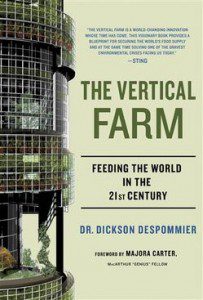

The Vertical Farm begins with a brief history of agriculture: how humans learned how to grow their food, slowly developing the technology to eke more and more from the earth. We learn about how machinery, petroleum, and fertilizer have impacted farming. But more importantly, Dr. Despommier reveals how farming, while growing more efficient, has slowly destroyed earth’s ecology. The burning of forests to provide farm lands and the resulting increase in global carbon dioxide, and the agricultural runoff that has lead to destruction of coral reefs, to name just two. Along the way we learn just how destructive big cities can be – New York City alone discards 1 billion gallons a day of grey water. These were the most compelling parts of the book, where I learned how good and bad growing food has been.
Next, Dr. Despommier turns to his solution to these problems and more – the vertical farm. He is clearly excited about how growing crops in skyscrapers, with aeroponic technology and extensive recycling, will solve many of the world’s environmental problems as they relate to agriculture. No longer will we have to discard so much precious water; land can be allowed to return to hardwood forests, decreasing carbon dioxide levels in the atmosphere; and perhaps the coral reefs can rebound as we stop dumping fertilizers into the oceans. These all seem reasonable scenarios. But will they work?
No one knows – not even Dr. Despommier, the consummate optimist, because a vertical farm has not yet been built. The last parts of the book, which deal with the specifics of the vertical farm, are singularly unsatisfying, because there are no details. As Dr. Despommier admits, this is because he is not an architect or engineer. We would like to know exactly how these farms of the future will be built, and their yields and energy costs, but that information cannot yet be provided. I understand all the reasons why – but perhaps Dr. Despommier should have engaged some experts to provide more details. As a result the latter half of the book is unsatisfying because you just can’t wrap your mind around exactly what these farms will be like.
In the end, The Vertical Farm is a dream by a particularly good dreamer. Whether or not those dreams will come true – Dr. Despommier certainly believes they will – is anyone’s guess. I’m rooting for Dickson and the solution to earth’s future food needs, but we’ll know the answer only when a vertical farm – or two – have been built.
Please accept my apologies for this brief foray away from virology – vrr

Pingback: The Vertical Farm « Yahyasheikho786's Blog
Pingback: Tweets that mention The Vertical Farm -- Topsy.com
Shades of Silverberg’s “Urban Monads”. 🙂
Is he aware of Buckminster Fuller’s designs for it? I don’t think Fuller had skyscrapers, but he had that concept, and he was an engineer. Could take a look in Synergetics if he hasn’t already. Not everything Fuller designed went to the patent office. I’d also comment that it’s a matter of energy cost to a significant degree. Modern farming is not the most productive use of soil by a long way, but it is the most economically productive. I worked on designs for applying robotics to farms. Have one minor patent for it. Robots can potentially do quickly what humans can do by hand to intensively garden/farm the soil without damaging it. But it will require a significant amount of work to make it happen. Energy is also a factor there. I think it’s something that the Gates Foundation should be doing. And these farm buildings are definitely part of that for some crops. Spent quite a bit of time with farmers who are very sharp people. Most of them are well aware of the problems and really want to do better. They know they and their workers have higher cancer rates from pesticides and antifungals. They know that land blows away on the wind and also just disappears as it oxidizes. Some areas have lost 20 feet of elevation in 100 years from the combination. They try to do everything possible within the limits of their economics. And many have sold out to conglomerates, staying on as manager employees in order to get better economies of scale and have some deeper pockets behind them.
nice theme. but it takes a while to load